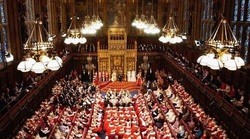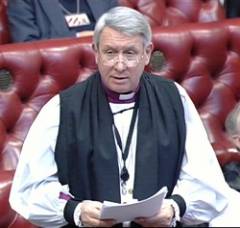
In a brief statement issued Wednesday, the leader of the Anglican bishops who sit in the House of Lords, said there would be no further organized opposition from them to the government’s “gay marriage” proposal, that Peers passed overwhelmingly on Tuesday evening.
“Both Houses of Parliament have now expressed a clear view by large majorities on the principle that there should be legislation to enable same-sex marriages to take place in England and Wales,” said Rt. Rev. Tim Stevens, Bishop of Leicester, the Convenor of the Lords Spiritual. “It is now the duty and responsibility of the Bishops who sit in the House of Lords to recognize the implications of this decision and to join with other Members in the task of considering how this legislation can be put into better shape.”
“Both Houses of Parliament have now expressed a clear view by large majorities on the principle that there should be legislation to enable same-sex marriages to take place in England and Wales,” said Rt. Rev. Tim Stevens, Bishop of Leicester, the Convenor of the Lords Spiritual. “It is now the duty and responsibility of the Bishops who sit in the House of Lords to recognize the implications of this decision and to join with other Members in the task of considering how this legislation can be put into better shape.”
Stevens added, “For the Bishops, the issue now is not primarily one of protections and exemptions for people of faith, important though it is to get that right, not least where teaching in schools and freedom of speech are concerned.”
There are a number of other “key” issues left to address, he said, including the approach of the bill towards “the question of fidelity in marriage and the rights of children.”
The bill maintains that adultery is legal grounds for divorce for heterosexual couples but not for same-sex partners.
The Lords voted 390 to 148 to accept the bill “in principle,” and to reject the proposal of Lord Geoffrey Dear to kill it on constitutional grounds. Campaigners on both sides were expecting a much closer vote, and the bill’s supporters had threatened that rejection by the Lords before the committee stage would precipitate a “constitutional crisis” as well as presenting the biggest threat of disestablishment the Church of England had seen in modern times.
At the same time, the CofE has angered parliamentary campaigners against the bill for refusing to support an attempt to extend civil partnerships to heterosexual couples that was supported as a side issue, a campaign that was supported by homosexual activist Peter Tatchell, who argued it was a matter of “equality.”
There are a number of other “key” issues left to address, he said, including the approach of the bill towards “the question of fidelity in marriage and the rights of children.”
The bill maintains that adultery is legal grounds for divorce for heterosexual couples but not for same-sex partners.
The Lords voted 390 to 148 to accept the bill “in principle,” and to reject the proposal of Lord Geoffrey Dear to kill it on constitutional grounds. Campaigners on both sides were expecting a much closer vote, and the bill’s supporters had threatened that rejection by the Lords before the committee stage would precipitate a “constitutional crisis” as well as presenting the biggest threat of disestablishment the Church of England had seen in modern times.
At the same time, the CofE has angered parliamentary campaigners against the bill for refusing to support an attempt to extend civil partnerships to heterosexual couples that was supported as a side issue, a campaign that was supported by homosexual activist Peter Tatchell, who argued it was a matter of “equality.”

The Archbishop of Canterbury, Justin Welby, who spoke strongly against the bill in the debate, has announced he will no longer support the change to the civil partnership law, under pressure from the CofE hierarchy.
Archbishop Welby had reportedly told Peter Tatchell in a meeting at the CofE headquarters in at Lambeth House that he would “personally vote” for the amendment. Anglican hierarchy objected that the move “would introduce further confusion about the place of marriage in society.”
With the withdrawal of all opposition from the Established Church, the government may now bring the process to a successful conclusion by the end of next week, the Guardian reports, with opposition now consisting only of Conservative Party backbenchers and a handful of Catholic Labour Party MPs.
In his statement, Stevens added, “If this Bill is to become law, it is crucial that marriage as newly defined is equipped to carry within it as many as possible of the virtues of the understanding of marriage it will replace.”
He vowed, “Our focus during Committee and Report stages in the coming weeks and months will be to address those points in a spirit of constructive engagement.”marriage” proposal, that Peers passed overwhelmingly on Tuesday evening.
“Both Houses of Parliament have now expressed a clear view by large majorities on the principle that there should be legislation to enable same-sex marriages to take place in England and Wales,” said Rt. Rev. Tim Stevens, Bishop of Leicester, the Convenor of the Lords Spiritual.
“It is now the duty and responsibility of the Bishops who sit in the House of Lords to recognise the implications of this decision and to join with other Members in the task of considering how this legislation can be put into better shape.”
Stevens added, “For the Bishops the issue now is not primarily one of protections and exemptions for people of faith, important though it is to get that right, not least where teaching in schools and freedom of speech are concerned.”
There are a number of other “key” issues left to address, he said, including the approach of the bill towards “the question of fidelity in marriage and the rights of children”. The bill maintains that adultery is legal grounds for divorce for heterosexual couples but not for same-sex partners.
At the same time, the CofE has angered parliamentary campaigners against the bill for refusing to support an attempt to extend civil partnerships to heterosexual couples that was supported as a side issue, a campaign that was supported by homosexualist activist Peter Tatchell who argued it was a matter of “equality”. The Archbishop of Canterbury, Justin Welby, who spoke strongly against the bill in the debate, has announced he will no longer support the change to the civil partnership law, under pressure from the CofE hierarchy.
With the withdrawal of all opposition from the Established Church, the government may now bring the process to a successful conclusion by the end of next week, the Guardian reports, with opposition now consisting only of Conservative Party backbenchers and a handful of Catholic Labour Party MPs. Welby had reportedly told Peter Tatchell in a meeting at the CofE headquarters in at Lambeth House that he would “personally vote” for the amendment. Anglican hierarchy objected that the move “would introduce further confusion about the place of marriage in society”.
The Lords voted 390 to 148 to accept the bill “in principle,” and to reject the proposal of Lord Geoffrey Dear to kill it on constitutional grounds. Campaigners on both sides were expecting a much closer vote, and the bill’s supporters had threatened that rejection by the Lords before the committee stage would precipitate a “constitutional crisis” as well as presenting the biggest threat of disestablishment the Church of England had seen in modern times.
In his statement, Stevens added, “If this Bill is to become law, it is crucial that marriage as newly defined is equipped to carry within it as many as possible of the virtues of the understanding of marriage it will replace.
“Our focus during Committee and Report stages in the coming weeks and months will be to address those points in a spirit of constructive engagement.”
Archbishop Welby had reportedly told Peter Tatchell in a meeting at the CofE headquarters in at Lambeth House that he would “personally vote” for the amendment. Anglican hierarchy objected that the move “would introduce further confusion about the place of marriage in society.”
With the withdrawal of all opposition from the Established Church, the government may now bring the process to a successful conclusion by the end of next week, the Guardian reports, with opposition now consisting only of Conservative Party backbenchers and a handful of Catholic Labour Party MPs.
In his statement, Stevens added, “If this Bill is to become law, it is crucial that marriage as newly defined is equipped to carry within it as many as possible of the virtues of the understanding of marriage it will replace.”
He vowed, “Our focus during Committee and Report stages in the coming weeks and months will be to address those points in a spirit of constructive engagement.”marriage” proposal, that Peers passed overwhelmingly on Tuesday evening.
“Both Houses of Parliament have now expressed a clear view by large majorities on the principle that there should be legislation to enable same-sex marriages to take place in England and Wales,” said Rt. Rev. Tim Stevens, Bishop of Leicester, the Convenor of the Lords Spiritual.
“It is now the duty and responsibility of the Bishops who sit in the House of Lords to recognise the implications of this decision and to join with other Members in the task of considering how this legislation can be put into better shape.”
Stevens added, “For the Bishops the issue now is not primarily one of protections and exemptions for people of faith, important though it is to get that right, not least where teaching in schools and freedom of speech are concerned.”
There are a number of other “key” issues left to address, he said, including the approach of the bill towards “the question of fidelity in marriage and the rights of children”. The bill maintains that adultery is legal grounds for divorce for heterosexual couples but not for same-sex partners.
At the same time, the CofE has angered parliamentary campaigners against the bill for refusing to support an attempt to extend civil partnerships to heterosexual couples that was supported as a side issue, a campaign that was supported by homosexualist activist Peter Tatchell who argued it was a matter of “equality”. The Archbishop of Canterbury, Justin Welby, who spoke strongly against the bill in the debate, has announced he will no longer support the change to the civil partnership law, under pressure from the CofE hierarchy.
With the withdrawal of all opposition from the Established Church, the government may now bring the process to a successful conclusion by the end of next week, the Guardian reports, with opposition now consisting only of Conservative Party backbenchers and a handful of Catholic Labour Party MPs. Welby had reportedly told Peter Tatchell in a meeting at the CofE headquarters in at Lambeth House that he would “personally vote” for the amendment. Anglican hierarchy objected that the move “would introduce further confusion about the place of marriage in society”.
The Lords voted 390 to 148 to accept the bill “in principle,” and to reject the proposal of Lord Geoffrey Dear to kill it on constitutional grounds. Campaigners on both sides were expecting a much closer vote, and the bill’s supporters had threatened that rejection by the Lords before the committee stage would precipitate a “constitutional crisis” as well as presenting the biggest threat of disestablishment the Church of England had seen in modern times.
In his statement, Stevens added, “If this Bill is to become law, it is crucial that marriage as newly defined is equipped to carry within it as many as possible of the virtues of the understanding of marriage it will replace.
“Our focus during Committee and Report stages in the coming weeks and months will be to address those points in a spirit of constructive engagement.”


 RSS Feed
RSS Feed